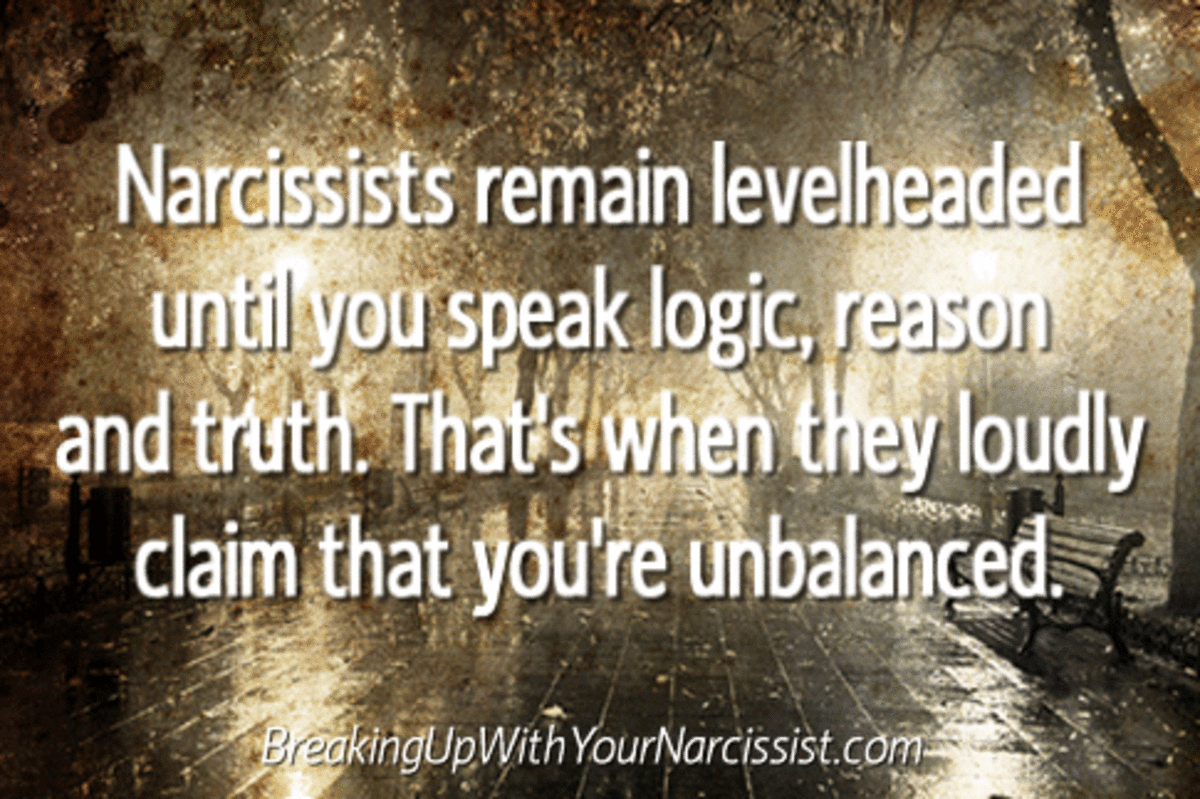There are monsters among us who sap our strength, make us feel like we are to blame for all their shortcomings, feed us abuse in the name of constructive criticism, make us feel inferior to them, and worst of are sexually sick and demanding. If we don't please them or worship they let us know what a terrible person we are:
A narcissistic, egocentric, grandiose blame shifter who fails to value or appreciate human traits like kindness, goodwill, or emotional sensitivity to other people’s needs while being fiercely envious of happy people, their goal is to target those they simultaneously envy and despise.
Their overwhelming sense of POOR ME coupled with Cartman’s style “I do what I WANT!” contemptuous arrogance cannot be denied.
The following article is presented here for academic purposes of evaluation. Please be sure to take a moment to visit the content producer’s website to check out their advertising and related content.
When engaging in the study of Narcissistic Abuse recovery methods, education and self-reflection are key.
Learning how to spot the red flags and warning signs that you are being targeted for social and emotional use and abuse by a person who is a vertical (meaning socially competitive) thinker rather than a collaborator can actually help any prospective Narcissistic Abuse victim decide whether or not socially engaging, remaining enmeshed with, or trying to “help” is actually going to be in everyone’s best interest… without the Empath’s own personal needs or well-being being ignored or in any way socially denigrated.
Before reading this article, take a moment to engage in an act of self-reflection. Ask yourself honestly while reading through this article — hopefully time and time again — the following questions.
- Who do I know that sounds like this?
- Who do I know who ACTS like this?
- Who do I know who is the most likely person to think like this in private, but who presents a different face when in public?
If the answer to any of the three core nature questions is you, historically speaking (from a forensic psychology perspective), it might be time to consider letting go of the toxic pattern of habitually engaging in low quality, non-reflective thought processes.
Once you know better, strive to DO better. The fastest and most direct route to ending enmeshment with toxic thinkers is to be critically self-evaluative — not to foster toxic shame or persecute.
If you are incapable of change, self-reflection, or lifetime learning, chances are COLLAPSED NARCISSIST or the nickname “Traumatized Narcopath” describes you. If that makes you feel nervous, uncomfortable, or persecuted then you can 100% confirm to your friends, co-workers, romantic interest(s), and family members that a Cluster B personality disorder has functionally impaired you.
Fictional sitcom character ARCHIE BUNKER is a clear example of the personality type of a Collapsed Narcissist. Passive-aggressive, socially hostile, and politically aggressive, they tend to repress physical aggression by channeling it into abusing preferred scapegoats such as other people they envy, don’t understand, or simply don’t like.
They are conscience-free when it comes to abusing, deriving pleasure from bullying, abusing, and negative attention-seeking. It’s not that they don’t have preferences for being surrounded by other people that they claim to know and love, but when empathy processing centers in the brain are either unused, inactive, or they are biologically damaged or not present, continuing attempts to communicate on any meaningful level is actually cruel and unusual punishment.
Socially identifying Cluster B actors is necessary for all social agents of change incarnated in bodies not neurologically damaged, medically impaired, or morally pre-destined to behave in such grandiose and egocentric manners that the character of the person can best be described as a high functioning social predator who is, by nature and most likely enabled by nurture, to reach new social lows that are perhaps best described as MORALLY, if not clinically, insane.
Thank you to the website that shared this profound insight. We are profoundly grateful for the insight share and emergent scholarly research link.
Students, psychologists, and forensic psychologists who write self-help literature, advocate, act as life coaches, or people involved with explaining the meta-narrative to the general public are likely to find this politically themed psychology article filled with social psychology insight.
Share this post to show victim support. It’s a time-sensitive reminder that while Archie and Edith Bunker (as cultural icons) might be quarantined [for the meantime, somewhat] in hyperspace, that their psychological infection is starting to spread.
Threatening the physical, psychological, and social well-being of ALL human beings, including putting the future of mankind and the planet at risk, “political bloodlust” is the hate-fueling addiction people with flatlined neural processing centers engage in for no other reason than to self-promote in such a way as to alleviate their own existential BOREDOM.
The COLLAPSED NARCISSIST mentality is a direct threat to Empaths and emotionally sensitive men, women, and children everywhere.
Pair the research on brain scans relating to empathy and the rise of TYLENOL as a common base for over 600 commonly used pain medication.
Add fluoride to the water and criminalize medical marijuana and the American Utopian Experiment is on a trajectory not just for fostering a social atmosphere of Ambient Abuse, but the sourceless anxiety most Empaths are feeling (even if they are still eyes wide shut asleep) is truly their autonomic nervous screaming ENOUGH IS ENOUGH.
It’s time to embrace the Christ Consciousness without being duped into believing martyrdom is moral or that enabling or tolerating and overlooking abuse does not do direct harm to all people victimized, terrorized, neglected, or abused.
Michael Moore, Jon Stewart, John Oliver, and Mike Rowe — let us know how #TeamEmpath and our staff can honestly help the most people.
Media seeking to define new role models for men would be well advised to create a new project comprised of survivor and HSP interviews. AI programmers, readers who work for NASA or on special contracts for the military and United States government, Scientists, and people with a love of lifetime learning would do well to reach out and consider the very real fact that like it or not, John Galt and Dagney Taggert might be functional and capable people in their own right, but Empaths require interaction with others on a profoundly meaningful, connectionsprep.com level in order to self-actualize.
Don’t believe us?
Ask Thomas Kuhn about how to spot an anomaly and Abraham Maslow.
Collapsed narcissists
By Jessika EndsleyImagine a person who is the sole victim of society. Someone who – if it were not for the societal makeup of the world, if it weren’t for the images the public had been force-fed by the media, if it weren’t for the fact that making money required hard work, if it weren’t for the innate desire for others to be loved – would be a very happy, outgoing person. Imagine someone who, deep down inside, is one of the elite, the beautiful, and the charming; if it weren’t for all the chemicals in the air, they’d be pretty. If it weren’t for the fact that social skill can take a lot of exposure and practice, they’d be absolutely every woman’s dream. And with beauty and charm, they would automatically be rich. By no fault of their own, they are stuck in a low-income household, doomed forever to isolation. Any chance they had at a good life was destroyed by others while they were still young enough to enjoy it.Now imagine reminding this person that they are responsible for their happiness, and that being “elite” requires putting in the effort. Then imagine them calling you crazy and selfish. And let’s say you believed them.Narcissistic Personality Disorder is an Axis 2 Personality Disorder alongside Psychopathy (Anti-Social Personality Disorder) and Borderline Personality Disorder. When most think of a Narcissist, they may think of a self-loving, extroverted celebrity who spends countless hours perfecting their appearance before going out to charm. This can be the case with the classical Narcissist, who has developed an excellent coping skill from a young age that allows them to function through a false-self and an inflated ego. However, clinical Narcissism is much more than just self-absorbed vanity, which is common in some amount in very healthy minds. Narcissistic Personality Disorder is marked by traits including lack of empathy, obsession with social status or grandiosity, superficial charm, and inability to listen to, or show any regard for, others. Every relationship, romantic or not, is a way for them to “feed” their Narcissism; they may love someone only as they would love their own pinky finger, and may miss someone as they would a severed limb (if severed limbs could regrow.) If you’re in a relationship with a Narcissist, remember that you are only an extension to them, and they don’t love you the same way you probably love them. Narcissists are emotionally stunted, although pinning a certain age on where the Narcissist’s emotional functions end would be an insult to children everywhere. A selfish six-year-old who daydreams of being an adored superhero and can’t quite grasp why mommy get so upset when he ruins her favorite decorations is rather normal, and forgivable. So is the tantrum he may throw when he does not get his way. But these traits in a fifty-year-old are worrisome and disturbing. Most people do continue to develop emotionally, and integrate with reality as the age, but when a person’s primary coping skills are stunted, many things can happen, including Narcissistic Personality Disorder.It is agreed in many psychiatric circles that Narcissists subconsciously have deemed themselves unacceptable to others, and their conscious, self-perceived grandiosity is an overcompensation. How this happens varies and is up for debate. Was the individual born with a very sensitive temperament? Was the child used a measurement for a parents own self-worth? It is not shocking that Narcissism develops as a way to cope with extreme self-hatred, but a Narcissistic Personality is a house built on stilts. No matter how many pillars are holding it up, no matter what they are made, that house can come crashing down. No matter how many extensions and sources of Narcissistic feed an individual may have, there is always a chance of the personality collapsing from severe Narcissistic injury. When this happens, there are three main outcomes: the Narcissist gets a strong reality check and attempts to develop new coping skills, the Narcissist re-builds his safety net of feed and continues his behavior, or the Narcissist stays collapsed and poisons everything he touches from the ground up. Every Narcissist is damaging to associate with, but the third outcome is the one I have the most experience in dealing with, and is the one I wish to address here.How the Narcissist Collapses
Narcissists of all kinds rely on a very fragile system of thoughts, behaviors, internalized ideals, outright lies, and sources of Narcissistic feed (also known as Narcissistic supply) to function. But, Narcissists themselves are volatile, unreliable, angry, immature, and erratic. This does not lead to happy long-term marriages or to stable careers, despite the many half-hearted attempts to create them; the people around them who are mistreated will eventually get sick of their shit and leave them behind. The Narcissist does not deal well with failure (or anything but stunning success) so having many failed relationships and careers only adds to the underlying lack of confidence. So while the Narcissist has done every self-destructive thing he could to ensure his own fall and abandonment by being erratic, self-absorbed, and abusive, he feels victimized and abused when it happens. He causes his own Narcissistic wound and then continues to pick at it until the entire limb is gone. The Narcissist has not lived up to his ideals and loses his human extensions, collapses, and settles into a mental loop of deluded, self-imposed nightmares. Maybe you see it happen, maybe you cause it, or maybe he has already been like this for years when you meet him. There are many scenarios that can help lead to a Narcissistic collapse, but “none of them are his fault.”The Collapsed Narcissist’s Inner Landscape
The collapsed Narcissist knows that he does not feel emotions the same way others do. What he does feel, he cannot recognize appropriately. He knows that he is failing to make real connections to others, and he knows that he cannot bond; if he wasn’t aware of this before he collapsed, he is now. He now abhors the thought of faking interpersonal connections, because it’s the fault of someone else that he cannot do it naturally. In the case I have the most experience with, it was deemed the fault of the entire social structure of humanity that this Narcissist cannot form deep emotional bonds to other human beings because they have negative empathy (they don’t only lack empathy, they get off on manipulation and causing pain.) He grows more and more depressed as he observes people making connections in public; seeing happy couples, groups of friends, or even politely-chatting acquaintances sends him into ablind rage. Violent thoughts emerge from these experiences, and during particularly abusive outbursts, he may detail the harm he wishes to cause to the people he calls “normal.” And if you object, you are part of the problem which needs to be solved.The collapsed Narcissist grows from being discontent to being depressed. His self-hatred is not hidden behind charm or lies of success anymore, and he knows he does not love himself and that he does not love others “although he tries.” He does not need to lie as much, although he still contradicts himself because it’s the only way he knows how to communicate. One collapsed Narcissist I have dealt with lied to me about his age when we met, telling me he was twenty-seven. One sentence later, he was whining in-depth about how he had not ever had his chance to party yet was “almost middle aged.” A collapsed Narcissists defenses have been broken down by his abandonment and the world feels hostile and unreal to him. Narcissists are emotional leeches, and his supply is gone, leaving him with the shell that was his true being the entire time. Now he has only his fantasies and his self-imposed victimization to keep him occupied. The one upside to the chronically collapse Narcissist is that a more honest and complete picture of what Narcissistic mind can be formed using their self-depreciating honesty. If you are unfortunate enough to become one of his confidants, due to your own caring nature or your own almost masochistic curiosity, you will quickly learn that this person is extremely empty.Trying to explain emotions and bonding to a Narcissist is akin to trying to explain color to someone who is entirely colorblind. It is frustrating and, when the Narcissist fails to understand or become “enlightened” to the world of deep feeling, he may accuse you of lying or conspiring against him. Logic does not work when speaking to a Narcissist. Even breaking down deep relationships and emotions using biological evidence about the purpose of, and the chemicals behind, basic human emotional bonding will send a collapsed Narcissist into a hysterical hissy fit. “You can’t possibly know what you’re talking about” and “People who form real connections don’t do it because of oxytocin!” are likely counter-arguments. Never mind that poets have never stopped trying to define love and that people have been philosophizing about emotions since the beginning of time; if you can’t explain it, you’re not really feeling it, and if you try to explain it, then you’re fake and even more of an emotional robot than the Narcissist.Collapsed Narcissists’ Social Life
Unlike the classical, still-functioning Narcissist, a chronically collapsed Narcissist likely has no social life or a very small one. If he was married, he probably isn’t anymore, and he may speak briefly to immediate family when he needs something. Because of their dependence on the emotional supply of others, when a Narcissist loses his social life, he may grasp desperately at nothing. They may stalk online, learning everything they can about a person they will never meet, and may never actually engage in a conversation with them. He has lost faith in establishing and maintaining relationships, so he may cultivate false online identities to satisfy a small part of his need for admiration. But, no matter how “close” he gets to his online friend, he will harbor resentment and hatred at the supposed “definite knowledge” that he or she would never really like the Narcissist if they were to meet in person. The Narcissist hates himself to such an extent that he projects his own self-hated onto others; everyone hates him, so why bother improving anything about himself? Why bother being nice? No one would like the “real him” anyway, so why not just be an abrasive dick?When a Narcissist who has spent many years as collapsed does decide to attempt social relationships, he becomes deeply infuriated and frustrated when things do not play out like they would in a party movie or a romantic comedy. Since Narcissists have no experience with real connections and true friendships based on mutual respect, they can only base “real” socializing on what is seen through entertainment. If you’re his “insider friend” and he confides in you, he will most certainly try to use you (and whatever social life you have left after maintaining prolonged contact with him) to grasp clumsily at new social experiences. He is so drained from having no real source of Narcissistic feed that he cannot be bothered with establishing and maintaining friendships; he will gulp down whatever he gets, even if it’s a drop. Going to a social gathering with a collapsed Narcissist is painful. He will likely spend ample time getting ready and then sit alone (or with you) while quietly raging about the audacity of the people around you to actually have fun, and if you’re feeling social, he will attack you for speaking to others. He will watch the other people closely and will hold it against each and every one of them for not “talking to him first.” It is not shyness, and it is not introversion; it’s pure malignant vanity.A chronically collapsed Narcissist cannot accept that there are people who are happy spending time alone. If you do, as his confidant, he will most certainly assure you that you spend time alone because other people hate you. Any evidence otherwise (such as friends asking you to go out and you declining) will be taken as your being self-absorbed and arrogant; they don’t really want to spend time with you, or you would have gone! You may catch yourself wondering if people really do hate you, and giving yourself a mental slap to keep from growing insecure. Any negative trait the collapsed Narcissist has will be projected onto you. Before you know it, you’re a vain, selfish, arrogant, lonely liar but you’re part of the very problem that caused him to be unhappy and empty his entire life.Narcissist Delusions of Innocence
Although a Narcissist who has had their identity collapse does often very openly hate themselves, he will still refuse to accept the part that he played in the outcome of his “awful” life. It is everyone else’s fault. It goes beyond blaming parents for a less than ideal upbringing. If he isn’t rich, it’s the fault of his upbringing for not being in the right area, or the fault of his school, or the fault of the way in which employees are chosen.It is never, ever, because he has given up on his hygiene and hasn’t applied for any jobs in the past two years, nor is it because he wore his shirt inside out to his last interview.If he cannot get a date, it’s the fault of everyone who didn’t go out with him. Never mind the fact that he didn’t ask anyone to go out with him. After all, they should be coming to him to be his date! If you decide to point out this loophole, he will remind you that any woman who would say yes to him would be “too ugly to bother with.” Just because he’s unlikable and probably unattractive does not mean he should have to settle for someone less than a twenty-five year old, female version of what he used to think he looked like (and yes, that is very often the case with Narcissistic preferences. Gross.)A collapsed Narcissist will likely grow to be delusional and paranoid. Paranoia itself is a byproduct of self-absorbed thoughts, but when the paranoia belongs to a clinical Narcissist, listening to the mental gymnastics that the individual uses to make themselves into a victim of society can make you feel the need to preform constant reality checks on yourself. That show with the man that’s more attractive than he is came on because he was watching television. There is a happy couple at the coffee shop because it makes him unhappy and he cannot have it. Being intelligent has “suddenly become popular” because he isn’t as smart as others. In this way, the world revolves around him for the sake of making him unhappy. He is a living, breathing embodiment of every time a person thought “why me?” The delusions of the specific brand of fucked-up individual can be so apparent that you may wonder how he has escaped being locked away. In one instance, while I was close to one of these individuals, I made a very basic video for my psychology-based Youtube channel. While I was pacing in the video, I turned to camera toward the mirror to briefly show my Easter dress to my viewers; a few hours after uploading the video, I learned that I had been reported by the Narcissist for “showing his picture” on my latest video. A moment of my own mild vanity in showing off my dress in the mirror had somehow been warped into me showing a picture of someone I had never even taken a picture of. I met with the police and we laughed and laughed.Surviving a Collapsed Narcissist
Being a confidant to a collapsed Narcissist (or any Narcissist) is damaging. It does not matter if you are an emotionally strong, non-delusional, well-adjusted individual; dealing with their delusional sense of entitlement and self-hatred will make you think you are crazy. You are not. Narcissists have an uncanny ability to gaslight everyone around them. They contradict themselves, they lie about things you did, they assure you that a lie is the absolute truth and may even suggest you seek help for not remembering events the way they are telling them. My relationships with Narcissists have happened due to my own curiosity and involvement with the mental health community. I cannot imagine the hell that people who marry these individuals go through, much less having them as parents. I can imagine that it requires a lot of therapy.A key to survival is to end the relationship. It may be a friendship, it may be romantic, or it could be a relative, but keep in mind that to them, you’re a self-regenerating pinky finger at best. You will not be missed the same way you would miss someone you love and have spent much of your life with. You’re an emotional-food source, not a human being. Only by ending the relationship to the collapsed Narcissist will you be able to see clearly; no one can see clearly with one deluded hand over their eye and someone lying in their ear. Narcissists are toxic, and collapsed Narcissists don’t even have the decency to hide that fact. Part of their function is to make you question your sanity, and even once you’ve determined you’re dealing with a Narcissist, it will still be almost impossible to keep your head above water. Many people see a Narcissist for what they are and still cannot resist the urge to “help” them. For those people, I have very little advice other than to run towards someone who wants help and can be helped. It certainly isn’t the Narcissist.







